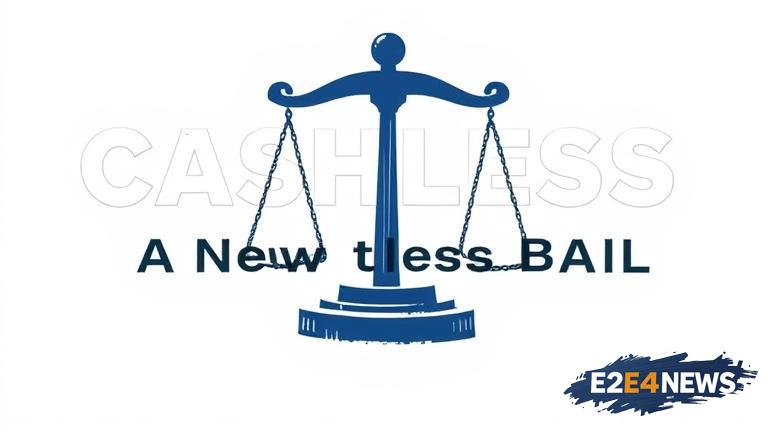The cashless bail system is a proposed alternative to the traditional bail system, where defendants are not required to pay a monetary fee to secure their release from jail while awaiting trial. This system has been touted as a more equitable and just approach, as it eliminates the financial burden that often disproportionately affects low-income individuals and communities of color. Proponents of cashless bail argue that it helps to reduce the number of people incarcerated pre-trial, which can have a significant impact on their lives, including loss of employment, housing, and family stability. Furthermore, cashless bail is seen as a way to address the issue of mass incarceration, which has become a major concern in the United States. The traditional bail system has been criticized for being unfair and biased, with many arguing that it perpetuates a cycle of poverty and inequality. In contrast, cashless bail systems use a risk-based assessment to determine whether a defendant should be released from jail, taking into account factors such as their criminal history, the severity of the offense, and their likelihood of returning to court. This approach is designed to ensure that defendants who are deemed low-risk are not unnecessarily incarcerated, while those who pose a higher risk to the community are held in jail. The concept of cashless bail has gained significant traction in recent years, with several states and cities implementing or exploring the use of cashless bail systems. For example, New York City has implemented a cashless bail system, which has been shown to reduce the number of people incarcerated pre-trial. Similarly, California has passed legislation to eliminate cash bail, replacing it with a risk-based assessment system. The use of cashless bail has also been endorsed by several high-profile figures, including politicians and celebrities. However, not everyone is in favor of cashless bail, with some arguing that it could lead to an increase in crime rates. Others have raised concerns about the potential impact on public safety, arguing that the release of defendants who pose a risk to the community could put innocent lives at risk. Despite these concerns, many experts believe that cashless bail is a step in the right direction, as it helps to address the systemic inequalities that have long plagued the justice system. In addition to reducing the number of people incarcerated pre-trial, cashless bail systems can also help to reduce the financial burden on taxpayers, who often foot the bill for the cost of incarceration. Moreover, cashless bail can help to promote a more just and equitable society, where individuals are not unfairly penalized due to their socioeconomic status. The implementation of cashless bail systems is not without its challenges, however. One of the main concerns is the need for significant investment in technology and infrastructure, including the development of risk assessment tools and the training of court staff. Additionally, there may be a need for increased funding for social services and community programs, which can help to support defendants who are released from jail. Despite these challenges, many believe that the benefits of cashless bail far outweigh the costs. As the justice system continues to evolve, it is likely that cashless bail will play an increasingly important role in shaping the future of justice reform. The use of cashless bail is not limited to the United States, with several countries around the world exploring the use of similar systems. For example, Canada has implemented a cashless bail system, which has been shown to reduce the number of people incarcerated pre-trial. Similarly, the United Kingdom has explored the use of cashless bail, with some arguing that it could help to reduce the number of people incarcerated in the country. In conclusion, the concept of cashless bail is a complex and multifaceted issue, with both proponents and opponents presenting valid arguments. While there are concerns about the potential impact on public safety, many believe that cashless bail is a necessary step towards creating a more just and equitable justice system. As the debate around cashless bail continues, it is likely that we will see significant developments in the coming years, as policymakers and justice reform advocates work to create a more fair and effective system.
